Israeli criticism of Secretary Kerry justified?
Amb. John Bolton weighs in on cease-fire negotiations
The State Department publicly battled a barrage of Israeli criticism on Monday over Secretary of State John Kerry’s efforts to secure a cease-fire with Hamas, in the latest signs of strain between the Obama administration and Israeli Prime Minister Benjamin Netanyahu’s government.
Administration officials spoke in unusually blunt terms in defending Kerry, accusing some in Israel of launching a "misinformation campaign" against the top American diplomat.
"It's simply not the way partners and allies treat each other," State Department spokeswoman Jen Psaki said.
Other branches of the administration also leapt to Kerry’s defense. National Security Adviser Susan Rice said they were “dismayed” by reports “mischaracterizing” Kerry’s efforts.
Her deputy, Tony Blinken, said "Israel has no better friend, no stronger defender than John Kerry."
By late in the day, both sides appeared to be trying to move forward, with Psaki saying the U.S. is working toward a “humanitarian ceasefire” and Israel’s ambassador to the U.S. saying he speaks for the prime minister in saying “the criticism of Secretary Kerry is unwarranted."
But the flare-up Monday was unusual even by the standards of the at-times chilly relationship between the Obama and Netanyahu governments.
U.S. officials said they were disappointed by Israeli reports that cast Kerry's efforts to negotiate a cease-fire as more favorable to Hamas, and by the apparent leaking of a “confidential draft.”
The coordinated pushback came amid growing U.S. frustration with the number of Palestinian civilian casualties as Israel wages an air and ground war in the Gaza Strip. Obama and Kerry have been pressing Israel to accept an immediate and unconditional humanitarian cease-fire.
The U.S. has made little progress in achieving that objective. Netanyahu said in a televised speech Monday that his country must be ready for "a prolonged campaign" against Hamas in Gaza.
As Kerry returned from the region over the weekend, Israeli media commentators leveled almost nonstop criticism of his attempts to bring Qatar and Turkey -- two countries viewed by Israel as strong Hamas supporters -- into the cease-fire negotiations. Kerry was also accused of abandoning some of Israel's key demands during the negotiations, including demilitarizing Gaza.
In trying to implement the cease-fire over the weekend, "U.S. Secretary of State of State John Kerry ruined everything," wrote columnist Ari Shavit in Monday's Haaretz, Israel's leading liberal newspaper. "Very senior officials in Jerusalem described the proposal that Kerry put on the table as a `strategic terrorist attack."'
U.S. officials disputed the notion that Kerry had formally presented a proposal and cast the document in question as a draft given to the Israelis as part of an effort to gain their input in seeking a weeklong cessation of hostilities. Officials said the draft was based on an earlier Egyptian cease-fire proposal that Israel had accepted but Hamas had rejected.
Psaki said the U.S. was "surprised and obviously disappointed" to see the draft proposal made public. She also argued that there was a difference between the characterization of Kerry's handling of the negotiations by Israeli media and what government officials were telling the U.S. privately.
"No one is calling to complain about the secretary's handling of the situation," Psaki said.
Kerry did not directly mention the criticism during brief remarks on Monday. However, he did seek to debunk the notion that the U.S. had backed away from its support for the demilitarization of Gaza, which has been a top priority for Israel.
"Any process to resolve the crisis in Gaza in a lasting and meaningful way must lead to the disarmament of Hamas and all terrorist groups," Kerry said.
While the Obama administration maintains that it supports Israel's right to defend itself against Hamas, officials have grown increasingly concerned about the civilian casualties in Gaza. The White House said Obama spoke with Netanyahu Sunday and expressed "serious and growing concern" about the worsening humanitarian situation in Gaza.
More than 1,000 Palestinians have been killed over the past three weeks, Palestinian health officials say. According to the United Nations, about three-fourths of them were civilians. Israel has lost 43 soldiers and two civilians, as well as a Thai worker.
On Monday, a strike on a Gaza park killed 10 people, nine of them children. Israeli and Palestinian authorities traded blame over the attack as fighting in the Gaza war raged on despite a major Muslim holiday.
Meanwhile, House Speaker John Boehner said Monday that support for Israel must be the United States' main focus and not peace mediation, in a subtle jab at the Obama administration.
"At times like this, people try to isolate Israel - but we are here to stand with Israel," Boehner said in remarks at the National Press Club. "Not just as a broker or observer -- but as a strong partner and a trusted ally."
The Associated Press contributed to this report.













































